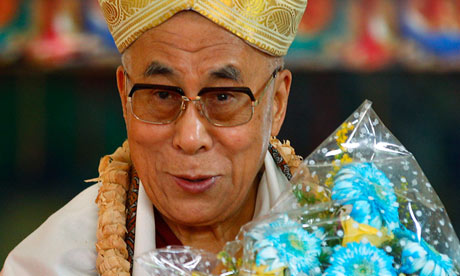Image may be NSFW.
Clik here to view. China vows to 'deepen the struggle' against Dalai Lama
China vows to 'deepen the struggle' against Dalai Lama
Yu Zhengsheng's comments indicate China's new government has not softened stance towards exiled Tibetan leaderChina's leading official in charge of religious groups and ethnic minorities has vowed to step up the fight against the Dalai Lama, as a rights group reported police have shot monks marking the exiled Tibetan spiritual leader's birthday.
The comments by Yu Zhengsheng, number four in the Communist party hierarchy, appeared aimed at thwarting speculation that China's new leadership could take a softer line on the Dalai Lama. Beijing considers the Dalai Lama, who fled China in 1959 after an abortive uprising against Chinese rule, to be a violent separatist. The Dalai Lama, who is based in India, says he is merely seeking greater autonomy for his Himalayan homeland.
Visiting a heavily Tibetan area of the western province of Gansu,
Yu told officials and religious leaders that the Dalai Lama's activities ran counter to the country's interests and to Buddhist tradition. "For the sake of national unity and the development of stability in Tibetan regions, we must take a clear-cut stand and deepen the struggle against the Dalai clique."
Buddhist leaders must be guided to oppose separatism and any efforts to damage the Communist party's leadership, added Yu, who is head of a largely ceremonial advisory body to parliament that aims to co-opt religious and minority groups.
Yu repeated that ties with the Dalai Lama would improve if he openly recognised that Tibet had been a part of China since ancient times and abandoned his Tibetan independence activities, the official news agency Xinhua reported.
"The Dalai Lama's 'middle way' aimed at achieving so-called 'high-degree autonomy' in 'Greater Tibet' is completely opposite to China's constitution and the country's system of regional ethnic autonomy," Yu added, according to Xinhua.
Speculation China would take a softer line towards the Dalai Lama had been fuelled in part by an essay written by a scholar from the Central Party School, who said that China could take some steps toward resuming talks with the Dalai Lama's representatives, which broke down in 2010.
Rights groups also say there has been some discussion about lifting restrictions on public displays of the Dalai Lama's picture in his birthplace of Qinghai province.
Yet some Tibet experts remained sceptical that the reports indicated a change in policy. "I think a lot of the reports ran away with themselves, and began to produce a narrative that was way, way ahead of the story," said Robbie Barnett, head of the Modern Tibetan Studies Program at Columbia University.
Despite a heavy security presence, protests and resistance against Chinese rule in Tibetan areas have continued. Police in a restive Tibetan part of Sichuan province opened fire on a group of monks and others celebrating the Dalai Lama's birthday at the weekend, seriously injuring at least two, the US-based International Campaign for Tibet said.
While Chinese security forces often use heavy-handed tactics to stop protests in Tibetan regions, they rarely use guns.
Officials reached by telephone in Ganzi said they had no knowledge of the incident.
China's foreign ministry said it was also unaware of the reports, but said the Dalai Lama was using the opportunity of his birthday to promote his separatist agenda.
At least 119 Tibetans have set themselves alight in protest against Chinese rule since 2009, mostly in heavily Tibetan areas of Sichuan, Gansu and Qinghai provinces rather than in what China terms the Tibet Autonomous Region. Most have died from their injuries.
Beijing has responded to the wave of self-immolations by tightening its control over the area. Analysts say that its means of pre-empting unrest have grown increasingly sophisticated in recent years, with the implementation of elaborate surveillance networks and mass resettlement programmes.
Authorities have forcibly relocated more than 2 million rural Tibetans into government-built housing complexes over the past seven years, the New York-based Human Rights Watch said in a report released last month, dealing a severe blow to their traditional way of life and leaving them with few economic prospects.
In a statement, the group's China director, Sophie Richardson, called the scope of the relocations "unprecedented in the post-Mao era".
"Tibetans have no say in the design of polices that are radically altering their way of life, and – in an already highly repressive context – no ways to challenge them," she said.
